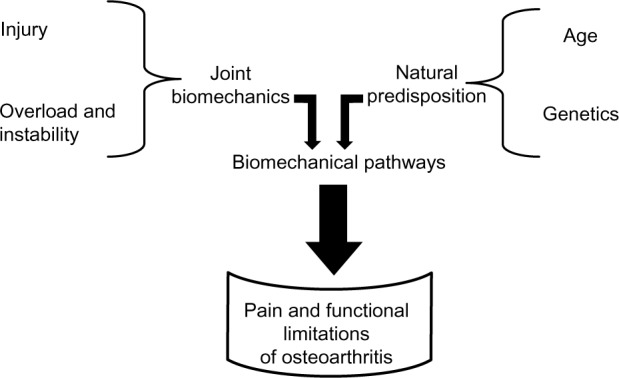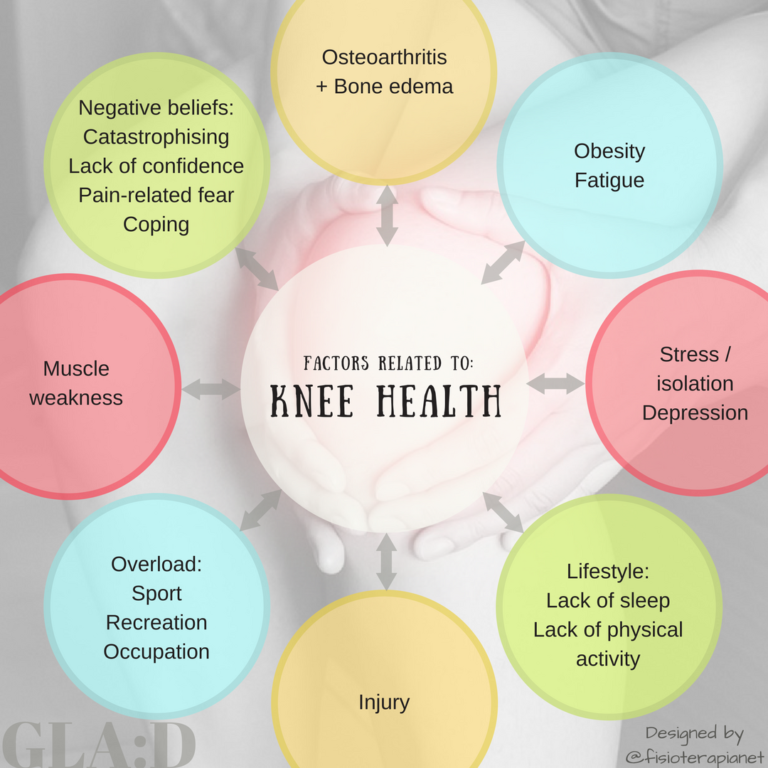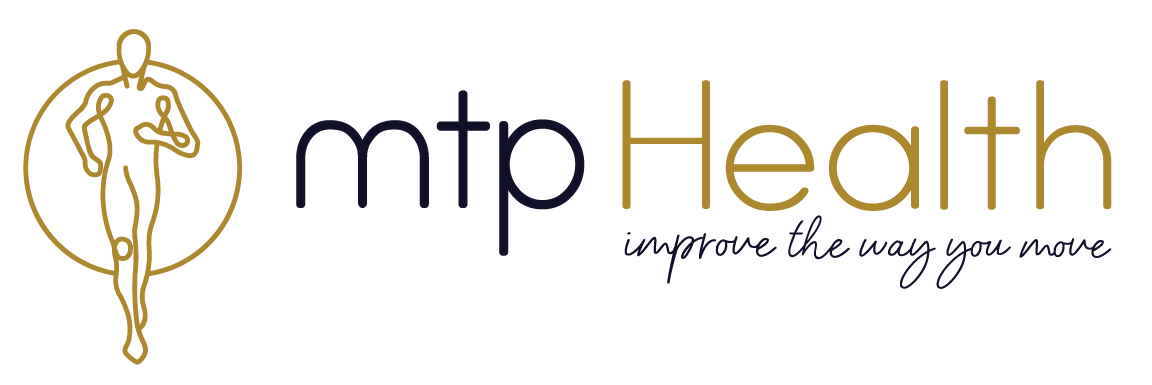Knee Pain – Causes, Symptoms & Most Effective Treatments [A Comprehensive Guide]
The Causes of Osteoarthritis
Note: Since writing this article we have expanded our original definition of ‘Osteoarthritis’ to generalised Knee Pain. This is in light of recent evidence that suggests both of these conditions are strongly related. Whenever we refer to Osteoarthritis, OA, or arthritis, you can take this information as being relevant to ‘Knee Pain’ in general.
What Actually Causes Osteoarthritis (watch the video above to see why we believe Osteoarthritis is synonymous with what is commonly described as ‘Knee Pain’)?
If you have Googled Osteoarthritis (OA) or knee pain in the past, chances are you have struggled to find anything particularly useful regarding your condition. Much of the information that is available, simply relates to what the condition actually is. If there is actual pragmatic information about improving your knee pain, it is likely to be fairly general, without a lot of scientific backing. Similarly, the large majority of information that is shared about improving knee pain is geared toward interventions that don’t require any involvement from the patient (i.e. passive interventions). Sadly, this information is all very much geared towards the patient being informed from a medical side of things. Now, we certainly aren’t saying this is a bad thing, nor are we saying that this in and of itself isn’t useful when it comes to knee pain. What we are saying, is that this information is not unique. It’s been around for years and can be found just about anywhere. On top of that, much of the information is fairly outdated, still pointing to common unhelpful narratives such as ‘wear & tear’ being the explanation behind the cause of OA. This can have a pretty major impact on our experience of knee pain.
What we want to provide you with is a completely novel guide to Osteoarthritis and knee pain. One that takes into account all of the factors that we deal with in our clinic, in order to provide people with life-changing results. One that is geared towards informing the patient why they might be struggling with OA and what they can actually do about their knee pain.
We want this to be like your ultimate guide. Your reference book. Your second opinion that you were always looking for but never able to get.
How do we have access to this information?
It’s quite simple really. We have been working with people who struggle with chronic knee pain for over 10 years now. In this time we have partnered with people from all corners of the medical industry. From specialised sports doctors to elite orthopaedic surgeons, we have gathered insights and experience from the world’s best. When we combine these practical insights working with actual people, along with our professional development at the forefront of scientific evidence, we are able to create the ecosystem we have at MTP Health. The insights we have shared with you are unique to us and as such will not be found anywhere else. These are the insights that have helped hundreds of people avoid knee surgery and get back to the things they love.
Our aim with this series is to provide cutting edge insights that are at the forefront of what is known in the healthcare industry. As independent exercise-based rehabilitation providers, we see far too much misleading information being passed around regarding OA for us not to do anything about it. This misinformation often leads people down the wrong path, causing their lives to be drastically affected by their knee pain.
What It’s All About!
We cannot stress enough how important education is to effectively manage OA. In our opinion, education is one of the most important factors when it comes to treating the knee pain associated with the condition. Effective education can have life-changing impacts on anyone who experiences OA. As such, we encourage you to take heed of the information contained in this series. Take your time to take it on board (it may take several weeks to fully digest and act on all of the wisdom that is contained within). Don’t be concerned at the sheer amount of information (there are a lot of high-quality resources linked within the articles).
If you think about the information in these articles like fast-tracking 20 years of research into a 7 part series, then it will help put just how useful this information is into perspective.
We recommend taking your time to revisit the posts multiple times in order to apply what is relevant. We want this resource to be as interactive as possible. As such ask us questions about anything you are unsure of or need help on. We have spent a lot of time perfecting this information in order to make it as useful as possible for you!
What Is Osteoarthritis?
Osteoarthritis is typically known as an idiopathic condition. That essentially means that there is no known cause. However, what we have experienced, is that while there is no known singular cause there are certainly patterns and clues that can help to identify the factors that may contribute to the condition developing. A big part of how we operate from an intervention point of view is to address these factors head-on, giving people the best chance to minimise the negative effects of their Osteoarthritis. This is quite a different approach to how many other specialists will deal with the condition. A lot of the common treatment interventions tend to revolve around addressing a small number of factors (or maybe just one), without looking at the whole picture as completely as we like to. This article series will give you insights into how we go about addressing the knee pain in a holistic manner that provides optimal results.
What Are The Causes Of Osteoarthritis?
It’s complicated!
Below we have a handy graphic that outlines some of the main causal factors of OA and associated knee pain. These factors came from a research review which focused on the physiological causes of OA in younger individuals. What we know from recent research and our own clinical experience, is that there is more to the story than just physiological factors. There are also a range of psychological factors that contribute both to the cause of OA as well as the experience of OA (more specifically the knee pain experienced as a result of the condition).

There are a host of factors to contribute to the development of Osteoarthritis
There are a host of factors to contribute to the development of Osteoarthritis
Taking a look at the second infographic below, you will notice some different factors being listed. This was something we wanted to address. Both of these images come from very popular sources regarding knee health and the causes of Osteoarthritis. As such, we have analysed this information and come up with our list of 7 factors. We have analysed the latest research and married it with our decades of clinical experience to bring you the most useful, pragmatic and up to date list on the real factors that contribute to osteoarthritis.
Another Holistic Look at The Factors That Cause OA

Another Holistic Look at The Factors That Cause OA
Part 1: Age
Age is strongly associated with the development of OA. We highlight why there might be more to the story than age itself being the cause and why what actually leads to OA developing, might be the factors that are associated with ageing instead.
Part 2: Injury
Prior injury is another factor that is strongly correlated with the development of OA. We show that while this is certainly the case, there are a whole host of behavioural factors associated with injury that can speed up the onset of osteoarthritic changes. These behavioural factors can be effectively mitigated via a comprehensive exercise and education program that is aimed at addressing knee pain head on.
Part 3: Lifestyle & Inflammation
Lifestyle and the factors associated with it are massive contributors to OA. We break up lifestyle into 3 main categories: Physical Activity, Diet and Stress. We show that one of the leading factors in the development of OA that is associated with lifestyle is actually the inflammation that is caused as a result of a poor lifestyle. We also show that on the flip side, a healthy lifestyle can not only improve someone’s condition of OA, but also drastically have an impact on their overall health and quality of life.
Part 4: Overweight
Being overweight is another factor that is strongly associated with the development of OA. In this article, we shed some light onto why we feel this is the case. We focus on the biomechanical side of things, hinting back to the biochemical side of things that we touched on in part 3. Ultimately we show that when weight is kept in a normal range, the condition of OA will improve, as well as the overall quality of life.
Part 5: Abnormal Joint Loading
In this article, we introduce the idea of abnormal joint loading and define it for our purposes as musculoskeletal specialists. We dive into the many factors that we look at when looking to address someone’s OA and show how we can minimise the factors that might be causing them to abnormally load their joints. We also showcase how we look at the issue of osteoarthritis by outlining some of the theory that our programs are based on. This ultimately shows how we go about returning someone to an optimal level of function through the vehicle of specialised exercise.
Part 6: Genetics
Genetics definitely have an impact on someone’s likelihood of developing OA in their lifetime. The key thing that we touch on within this article is that genetic factors aren’t completely out of our control. We explain why not all genetic factors are the same in terms of how they contribute to OA, as well as touching on the many unknowns surrounding this area. We also show that those who live the healthiest lives are the least likely to develop OA, regardless of genetics.
Part 7: Psychology
Psychological factors are in our opinion one of the biggest contributors to someone’s condition of OA. In this article, we address the complexity of this issue and showcase why it is seldom effectively addressed. We also highlight the key features associated with pain and how this can be managed. We then touch on some examples that showcase exactly what having good psychology can do for the condition and development of OA. Ultimately we show that a person need not be limited by their condition, provided they have the effective support and beliefs.
Conclusion
OA is a condition that does not need to drastically affect the lives of the large majority of our global population. When properly managed, we show that OA can be something that has only mild impacts on someone’s quality of life.
Why Is It Important To Learn About Osteoarthritis?
This whole article series has been created to offer a sneak peek into our ecosystem at MTP Health. This ecosystem goes above and beyond what is being done by the rest of the industry, being centred around the most important thing of all: The result for the patient. From our point of view, this is the way the healthcare industry is headed and is something that we are more than happy to lead the charge on. This shift has come about as it has become more and more apparent how much we need value-based healthcare that works with the patient in order to get the best result possible. This is the only way our healthcare system will succeed in the age of chronic disease.
We want this information to be shared across the globe, in order to hopefully have an impact on how musculoskeletal rehab is done. We see so many people who are in need of this information worldwide. Each and every day we are able to see the positive benefits with the people we work with (both patients and medical specialists) and so we hope that we will be able to extend some of these benefits to other people who are experiencing similar issues.
If you’re here because you’re experiencing your own knee pain, we’re here to help. To take action toward finally getting rid of your knee pain for good click HERE.
P.s. If the information within this article series has resonated with you or if you have any questions, please get in touch. We’re passionate about changing the world of healthcare at large, so we would love to hear from you!
